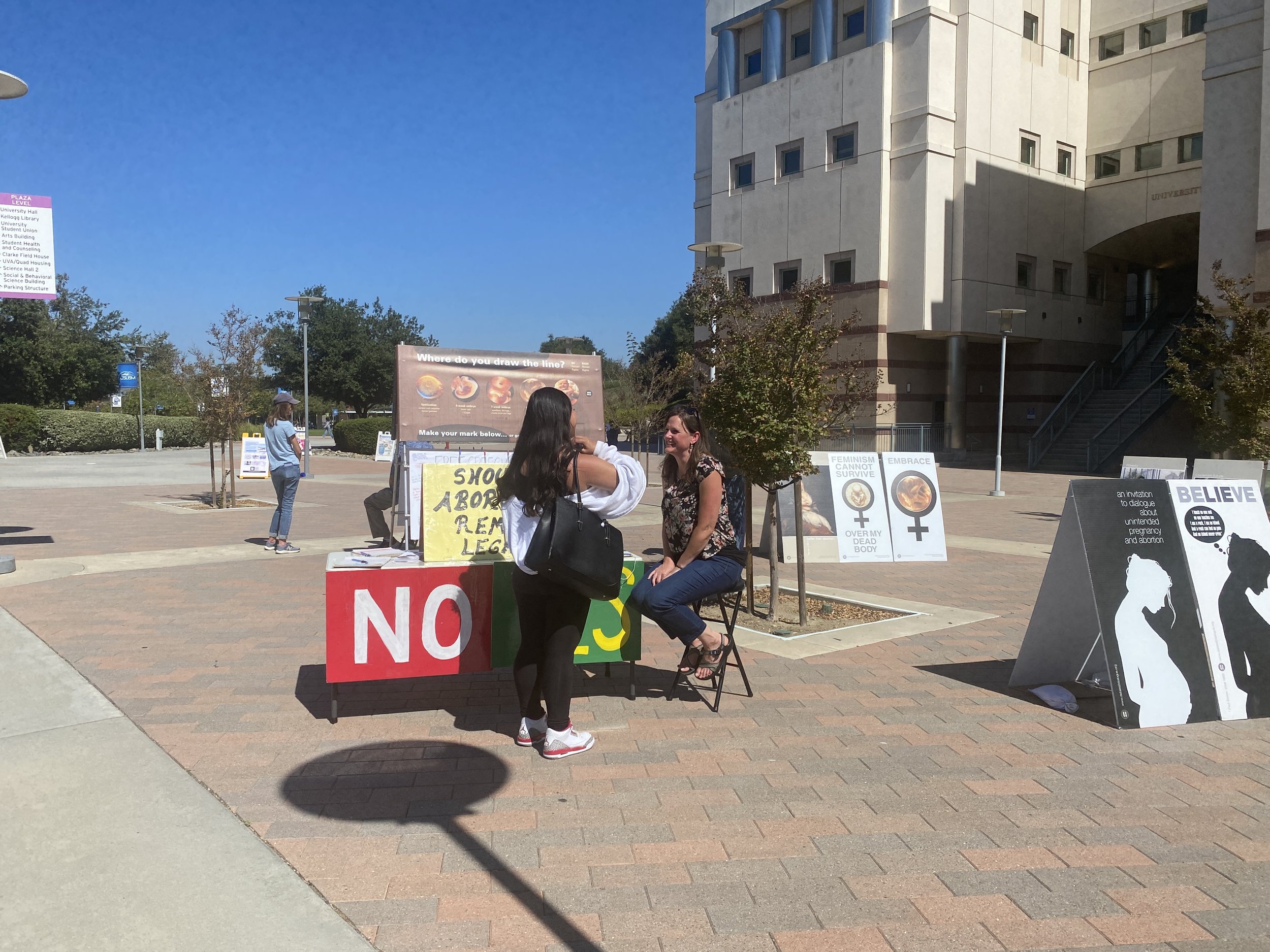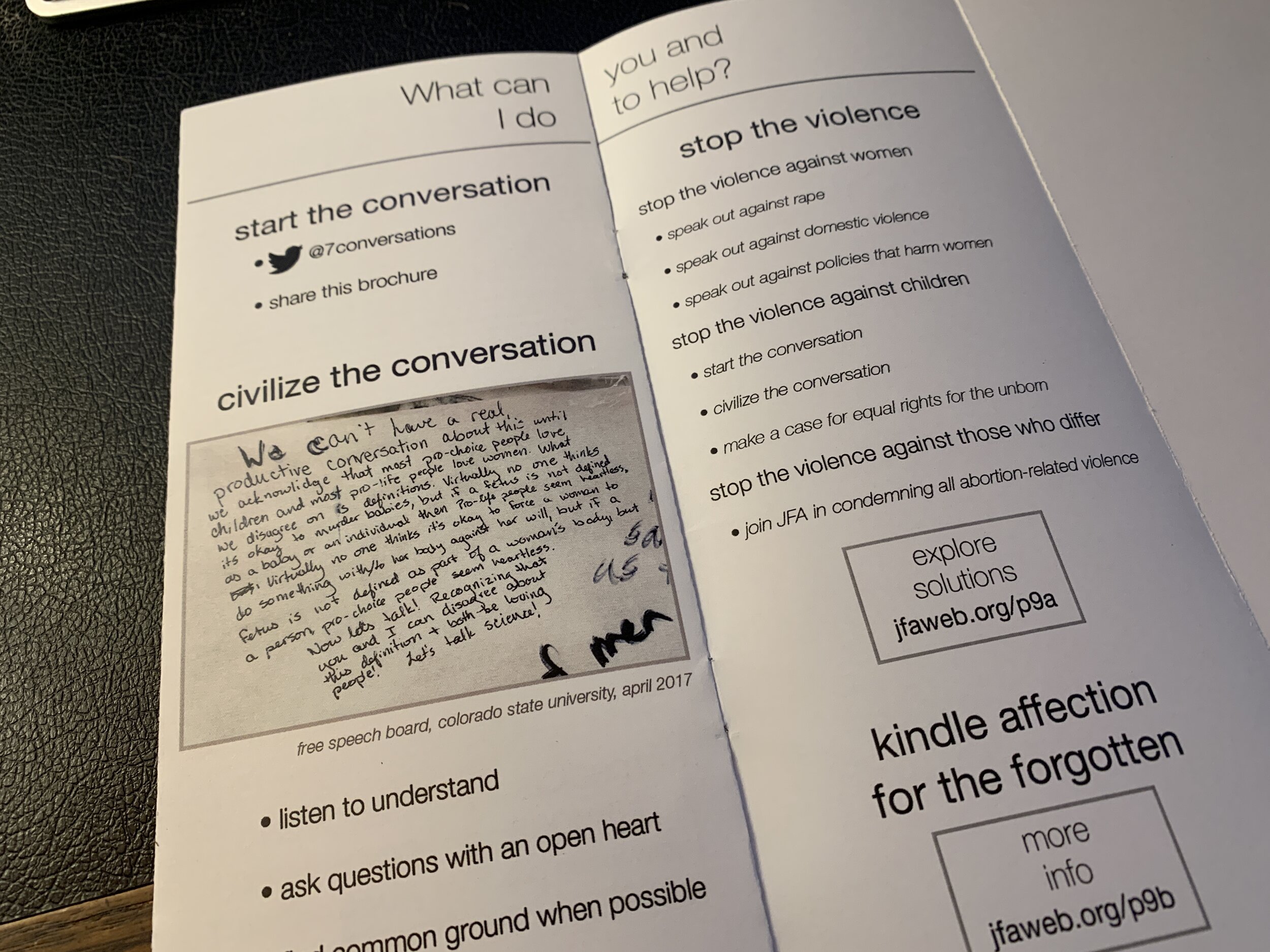Dear Friends,
I hope this finds you well. The past six weeks have brought about a myriad of changes for most of us. It’s been quite an emotional roller coaster, but I am doing okay. Just striving to trust God. I’ve been praying for you.
I was filled with sadness in March due to the cancellation of the remainder of JFA’s training events this semester. It was a tough pill to swallow since I love doing outreach events! My fellow trainers and I have spent the last month working on several projects that will benefit our Training Program. We are now offering online events! Go to the JFA calendar for dates and details.
The last JFA outreach event this semester was held in March at the University of Texas at Dallas (UTD). I had great conversations that resulted in many pro-choice advocates rethinking their views. It was my last conversation, however, that was the most memorable. Here’s that story:
“Harper” was part of an active group of protesters that had grown to about 25 people on day three. I felt drawn to talk to him, but I was fearful. Would I encounter openness or hostility? The Holy Spirit lifted my fear and filled me with courage.
I introduced myself and expressed a desire to learn about his view. He voiced heartfelt concern for women not ready for pregnancy. He doesn’t believe in forcing women to carry to term, especially in cases of rape and health risks. I agreed those are tough situations, commended his compassion, and discussed it further.
I sat and listened to his concerns such as taking away choices from women and caring about children who are unloved in foster care. We discussed the humanity of the unborn and equality of all human beings. I found common ground including agreement that third trimester abortions should be illegal. It was heartbreaking to hear him speak of losing his mom, and of the racism he’s experienced as a Muslim in the U.S. He was genuinely interested in hearing a different perspective on abortion.
Then the conversation took an unexpected turn. Harper said to me, “I think I can trust you with this information. My girlfriend was raped and had an abortion two years ago.” My heart sank, and I could see the pain in his eyes and hear it in his voice. I asked how she’s doing. He said she’s having a really rough time, and he has felt helpless the past two years. She is going through counseling which has been beneficial for her. I expressed my sorrow and just listened.
Then I had an aha moment! His view on abortion was being influenced by his girlfriend’s pain. Because of my willingness to invest time listening and sharing genuine compassion, Harper finally let his guard down. And now I knew where to go next.
I commended his desire to alleviate suffering. I agreed that life is hard and that it’s not a matter of if we will face tough life challenges, but when! We should take advantage of learning from each challenge, instead of trying to escape from it. I revisited our earlier discussion of God and faith. Here’s a portion of what I said:
I tried handling some of my toughest trials on my own, but I failed miserably. Laying my problems at God’s feet and asking for help had the opposite result. I’m not implying that my problems were solved immediately, but I was better equipped to endure the bumpy road. A cancer diagnosis was one of the best things to ever happen to me. I had nowhere to go but to God, and He drew me close to Him in a way I’d never experienced. It could have been a very dark time, but instead, I felt so much peace. That life-changing event prepared me for future challenges including a severe health issue that nearly took my life two years ago. A woman who perseveres through an unwanted pregnancy can learn exponential life lessons that no money can buy. She can inspire the world. God has no limits.
Harper was pro-choice at the start of this conversation and believed a woman should have a right to an abortion for any reason at any time. At the end he believed abortion should only be allowed for cases of rape, incest, and health of the mother in the first trimester only. At the end he was opposed to the majority of abortions, which was a huge change. Harper said,
“Thanks for having this conversation. It’s been really good and refreshing, and I’ve really enjoyed it. You have a lot of great knowledge that’s been helpful to me. It’s good to learn what “pro-life” really means. I believe your group has every right to be here [remember, he was a protester], and I appreciate the way you’re attempting to dialogue with students. I think that’s healthy.” As he started to walk away, I told him that I would be thinking of him and his girlfriend, praying for them, and that I hope she starts feeling better soon. He said, “Thank you. I really appreciate that. I really do.”
Good, solid pro-life arguments are crucial in a dialogue with a pro-choice advocate, but they must always be combined with patience, listening, compassion, asking questions, and finding common ground. These qualities help us to love all three— the woman, the child, and those who disagree—equally. Then we can look for an opportunity to share the reason for our hope. I believe that God was the one that softened Harper’s heart and helped him move away from his hardcore pro-choice beliefs.
In Christ,
Tammy Cook















